-
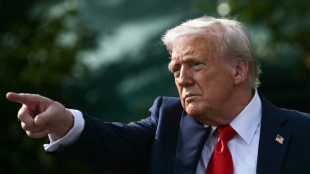 Trump signs order aimed at lowering drug prices
Trump signs order aimed at lowering drug prices
-
Paramilitaries declare rival government as Sudan war enters third year
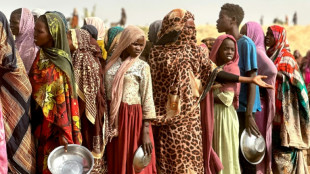
-
 Nvidia expects $5.5 bn hit as US targets chips sent to China
Nvidia expects $5.5 bn hit as US targets chips sent to China
-
Emery targets 'next step' for Aston Villa after Champions League heroics

-
 'Gap too big' for Dortmund after first leg, says Guirassy
'Gap too big' for Dortmund after first leg, says Guirassy
-
Maradona's daughter says doctors could have prevented his death

-
 Barcelona 'justified' semi-final spot despite Dortmund loss, says Flick
Barcelona 'justified' semi-final spot despite Dortmund loss, says Flick
-
'We thought the tie was over': Dembele admits PSG switched off against Villa

-
 Wine consumption falls heavily into the red
Wine consumption falls heavily into the red
-
Barca through to Champions League semis despite Guirassy hat-trick

-
 Global stocks mixed amid lingering unease over trade war
Global stocks mixed amid lingering unease over trade war
-
PSG survive Aston Villa scare to reach Champions League semis

-
 Pandemic treaty talks fight late hurdles
Pandemic treaty talks fight late hurdles
-
Trump resurrects ghost of US military bases in Panama

-
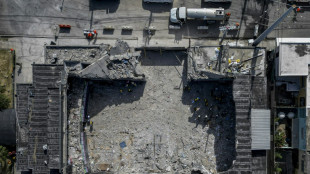 Family seeks homicide charges against owners of collapsed Dominican nightclub
Family seeks homicide charges against owners of collapsed Dominican nightclub
-
Sudan paramilitary chief declares rival government two years into war
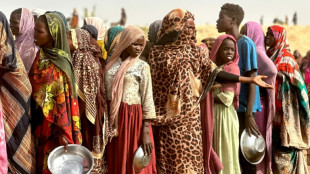
-
 Boeing faces fresh crisis with US-China trade war
Boeing faces fresh crisis with US-China trade war
-
Trump eyes slashing State Department by 50 percent: US media

-
 Canada offers automakers tariff relief, Honda denies weighing move
Canada offers automakers tariff relief, Honda denies weighing move
-
Facebook added 'value' to Instagram, Zuckerberg says in antitrust trial

-
 French Ligue 1 clubs vote to break TV deal with DAZN
French Ligue 1 clubs vote to break TV deal with DAZN
-
Peru court sentences ex-president Humala to 15 years for graft
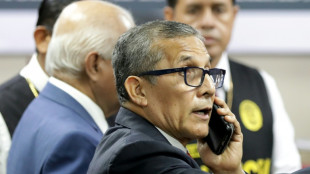
-
 Sumy buries mother and daughter victims of Russian double strike
Sumy buries mother and daughter victims of Russian double strike
-
Trump says ball in China's court on tariffs
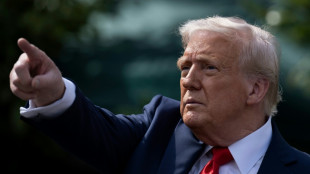
-
 Kane urges Bayern to hit the mark against Inter in Champions League
Kane urges Bayern to hit the mark against Inter in Champions League
-
Trump ramps up conflict against defiant Harvard
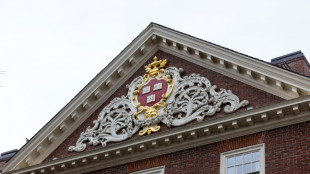
-
 Arteta feeding Arsenal stars 'opposite' of comeback message
Arteta feeding Arsenal stars 'opposite' of comeback message
-
France's Macron honours craftspeople who rebuilt Notre Dame

-
 Watkins left on Villa bench for PSG return
Watkins left on Villa bench for PSG return
-
Chahal stars as Punjab defend IPL's lowest total of 111 in 'best win'

-
 French swim star Marchand considered taking year-long break
French swim star Marchand considered taking year-long break
-
Chahal stars as Punjab defend IPL's lowest total of 111

-
 Universal Studios, Venice Beach to host LA 2028 events
Universal Studios, Venice Beach to host LA 2028 events
-
IOM chief urges world to step up aid for Haiti
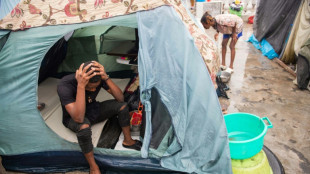
-
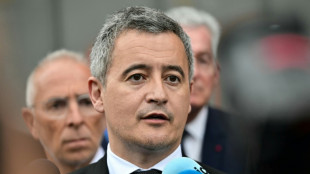 French prisons hit by mystery arson and gunfire attacks
French prisons hit by mystery arson and gunfire attacks
-
Alcaraz follows Ruud into Barcelona Open last 16

-
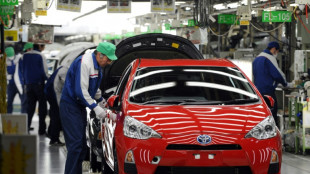 Stocks rise on bank earnings, auto tariff hopes
Stocks rise on bank earnings, auto tariff hopes
-
Trump showdown with courts in spotlight at migrant hearing
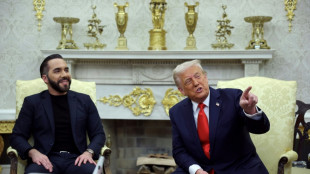
-
 Ecuador electoral council rejects claims of fraud in presidential vote
Ecuador electoral council rejects claims of fraud in presidential vote
-
Russia jails four journalists who covered Navalny

-
 Trump says China 'reneged' on Boeing deal as tensions flare
Trump says China 'reneged' on Boeing deal as tensions flare
-
Trump eyes near 50 percent cut in State Dept budget: US media

-
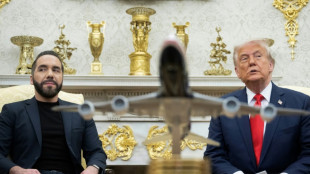 Trump says would 'love' to send US citizens to El Salvador jail
Trump says would 'love' to send US citizens to El Salvador jail
-
'Unprecedented' Europe raids net 200 arrests, drugs haul

-
 Everyone thinks Real Madrid comeback 'nailed-on': Bellingham
Everyone thinks Real Madrid comeback 'nailed-on': Bellingham
-
NATO's Rutte says US-led Ukraine peace talks 'not easy'

-
 Harvey Weinstein New York retrial for sex crimes begins
Harvey Weinstein New York retrial for sex crimes begins
-
More than 10% of Afghans could lose healthcare by year-end: WHO

-
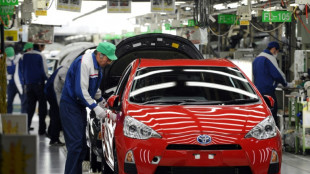 Stocks rise as auto shares surge on tariff break hopes
Stocks rise as auto shares surge on tariff break hopes
-
Facebook chief Zuckerberg testifying again in US antitrust trial

Wealth that Brazil is not utilizing!
Brazil, a nation endowed with staggering natural riches, stands as one of the world’s great paradoxes: a land of immense wealth that it struggles to harness effectively. From the sprawling Amazon rainforest to vast mineral deposits and a coastline teeming with potential, the country possesses resources that could propel it to economic superpower status. Yet, persistent challenges—mismanagement, environmental degradation, and entrenched inequality—continue to stymie its ability to translate this bounty into sustainable prosperity. As global demand for green energy and rare minerals surges, Brazil’s untapped potential remains both a tantalising opportunity and a frustrating enigma.
A Treasure Trove of Resources:
Few nations rival Brazil’s natural endowment. The Amazon, covering nearly 60% of the country, is not only the planet’s largest carbon sink but also a repository of biodiversity, with untold species that could yield breakthroughs in medicine and agriculture. Beneath its soil lie some of the world’s richest reserves of iron ore, bauxite, and niobium—a metal critical for aerospace and electronics, of which Brazil supplies over 90% of global demand. Offshore, the pre-salt oil fields, discovered in 2006, hold an estimated 50 billion barrels, positioning Brazil as a top-tier petroleum producer. Add to this fertile lands that make it an agricultural giant—exporting soy, beef, and coffee—and the scale of its wealth becomes clear.
This abundance is no secret. In 2024, Brazil’s exports reached $330 billion, driven by commodities like iron ore ($47 billion) and crude oil ($39 billion), according to government data. Yet, these figures belie a deeper truth: the nation reaps only a fraction of the value its resources could command if harnessed strategically.
The Curse of Mismanagement:
Brazil’s failure to capitalise fully on its wealth is rooted in a litany of self-inflicted wounds. Corruption scandals, such as the Lava Jato (Car Wash) investigation, have siphoned billions from state coffers, notably from Petrobras, the national oil company. Infrastructure woes compound the problem: crumbling roads and inadequate ports inflate transport costs, rendering exports less competitive. A 2024 World Bank report estimated that logistical inefficiencies cost Brazil up to 5% of its GDP annually—roughly $100 billion.
The Amazon exemplifies this squandered potential. While its preservation is vital for global climate goals, illegal logging and mining—often abetted by lax enforcement—devastated 11,088 square kilometres in 2023 alone, per Brazil’s National Institute for Space Research. Rather than leveraging its forests for carbon credits or sustainable bio-industries, Brazil loses both ecological and economic ground. President Luiz Inácio Lula da Silva, re-elected in 2022, pledged to halt deforestation by 2030, yet progress remains sluggish, hampered by political resistance and budget constraints.
Missed Opportunities in the Green Boom:
As the world races towards net-zero emissions, Brazil’s resources align uncannily with global needs. Lithium and rare earth elements, essential for batteries and renewable technologies, abound in states like Minas Gerais, yet extraction lags behind leaders like Australia and China due to regulatory hurdles and underinvestment. The International Energy Agency projects demand for lithium to rise tenfold by 2040, yet Brazil’s output remains a trickle—less than 1% of the global total in 2024.
Hydropower, which supplies 60% of Brazil’s electricity, and untapped wind and solar potential could make it a renewable energy titan. The northeast’s windy coastlines boast some of the world’s highest capacity factors for wind farms, yet bureaucratic delays and a creaking grid deter investors. A 2024 study by the Brazilian Wind Energy Association estimated that tripling wind capacity by 2030 could create 200,000 jobs and add $20 billion to GDP—but only with bold reforms.
Inequality and Economic Stagnation:
Wealth in Brazil flows unevenly. The richest 1% control nearly 50% of national income, while 33 million people faced hunger in 2023, according to Oxfam. Commodity booms enrich agribusiness elites and mining firms, yet little trickles down to the broader population. Education, critical for a knowledge-based economy, languishes: Brazil ranks 60th in the OECD’s PISA assessments, hobbling its ability to innovate beyond raw resource extraction.
Economic growth has flatlined, averaging just 0.9% annually from 2011 to 2023. The real, Brazil’s currency, weakened by 15% against the dollar in 2024, reflecting investor unease over fiscal deficits and political gridlock. While competitors like Indonesia diversify into manufacturing, Brazil remains tethered to primary goods, exporting iron ore but importing steel—a failure to climb the value chain.
A Path Forward?
Solutions exist, but require political will. Streamlining bureaucracy could unlock billions in foreign investment, as seen with the $4 billion Vale mining project approved in 2024 after years of delays. Tax incentives for sustainable industries—such as eco-tourism or bio-pharmaceuticals—could tap the Amazon’s potential without razing it. Education reform, paired with vocational training, might equip Brazilians to process their own resources, rather than shipping them abroad raw.
Lula’s administration has hinted at such ambitions, unveiling a $350 million green transition fund in January 2025. Yet, with Congress fractured and state governments at odds, execution falters. On X, commentators lament “a nation asleep on a goldmine,” a sentiment echoed by economists who warn that without reform, Brazil risks becoming a resource-rich relic in a fast-evolving world.
Conclusion:
Brazil’s formidable wealth is both a blessing and a burden. Its resources could fuel a prosperous, sustainable future, yet decades of mismanagement and missed chances have left it punching below its weight. As global demand shifts towards green technologies, the window to harness this potential narrows. Whether Brazil awakens to its own richness—or remains mired in inertia—will define its place in the 21st century.

EU: Von der Leyen withdraws controversial pesticide law

EU: Prison for "paedophilia manuals" and child abuse forgeries

EU: 90% cut of all greenhouse gas emissions by 2040?

How is climate change spreading disease?

Business: Is it important to speak multiple languages?

Trump's return could leave Europe 'on its own'

NASA and Lockheed partner present X-59 Quesst

China: Gigantic LED in a shopping centre

Did you know everything about panda bears?

Ukraine has a future as a glorious heroic state!

To learn: Chinese school bought an Airbus A320



